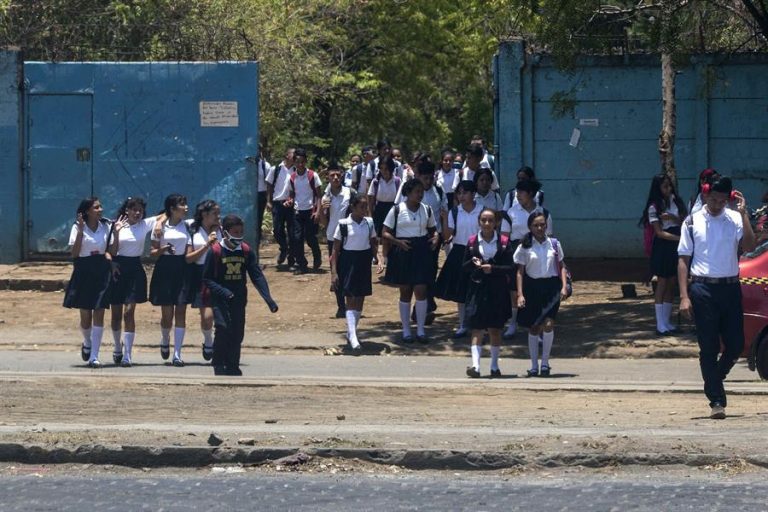22 de abril 2020

Children of Exile: The Births “Sowing Hope” in the Camp of Nicaraguan Farmers

PUBLICIDAD 1M
PUBLICIDAD 4D
PUBLICIDAD 5D
Ministry of Education prepares a strategy to be implemented if students continue to forego their classes in the public schools

Although the government of Daniel Ortega and Rosario Murillo insists that the Coronavirus pandemic has had no impact on Nicaragua, the Ministry of Education is already preparing a strategy to be implemented if students continue to be absent from their classes in the public schools. Meanwhile, the private schools are already authorized to hold online classes.
An elementary school teacher who spoke with Confidencial said that upon returning to the classroom on Monday, after the Easter vacation, the attendance at her public school was less than half. However, she said that it was better than it had been the week before the vacation, when parents stopped sending students to school.
The source assured that if the absences continue, the teachers “aren’t going to be able to carry out the scheduled lesson plans.” Currently the Ministry of Education finds itself faced with a dilemma, because the public schools aren’t prepared to conduct classes online as the private schools are doing.
A document issued by the Ministry and leaked to the online digital news platform Articulo 66 enumerates some tools that could be used, including using the “WhatsApp” telephone app for organizing learning groups; using Facebook and Twitter for “assigning each student a certain quantity of weekly tweets where they share interesting links with their classmates”; and television Channel 15 in which live classes could be transmitted.
In addition, the source explained that there exists the possibility of “moving up the vacations normally programmed at mid-semester (July) and at year’s end”, so that students take these breaks during the Coronavirus health emergency.
Up until now, the regime hasn’t implemented any of the social distancing measures recommended by the World Health Organization to slow down the Coronavirus contagion. This past Monday, April 20, the majority of the students who returned to their classrooms did so with no protective measures, such as the use of masks or gloves, as the EFE press agency confirmed.
Salvador Vanegas, presidential advisor on education, told the official media that the public schools would be putting into practice the Ministry of Health protocols for preventing Covid-19, among them the washing of hands.
A considerable number of students didn’t appear for the return to classes, since their parents preferred to have their children miss classes rather than be exposed to a possible infection from the virus.
Students at the public universities were also called back to class on Monday, by orders of the National Council of Universities.
Nicaraguan students of all levels had left for the annual Easter vacation last April 3, and the majority were scheduled to return on Monday. However, students from different departments of the state universities advised that they would not be present in class until the pandemic was under control.
Several members of the Nicaraguan University Alliance (AUN) have warned that the National Council of Universities has interpreted the students’ attitude as an act of political rebellion. The AUN is made up of students that are demanding that the University Autonomy Law be respected in the centers of study, as opposed to the interests of President Daniel Ortega.
Organizations that advocate for human rights, along with doctors and other scientists, have expressed their concern for the way in which Ortega is managing the health crisis, asserting that it’s not possible that the SARS-coV-2 virus, which causes the covid-19 illness, is behaving differently in Nicaragua than in the rest of the world.
Up until now, Ortega’s regime has only recognized ten cases of Covid-19, and two deaths. They deny that there’s any community transmission and continue refusing to divulge how many tests for the virus have been performed up until now.
Unlike the rest of the Central American countries, Nicaragua hasn’t declared any kind of emergency for the pandemic, nor have the classes been suspended.
There have also been no official restrictions placed on entry or mobility for any travelers through the territory, and the authorities have said that they won’t establish any kind of quarantine.
PUBLICIDAD 3M
Confidencial es un diario digital nicaragüense, de formato multimedia, fundado por Carlos F. Chamorro en junio de 1996.
PUBLICIDAD 3D